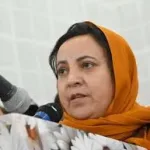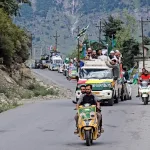Move was part of 70-year old exercise to integrate J&K to the Union
‘Conduct J&K Assembly election by Sept 30, 2024’
Restoration of statehood shall take place as soon as possible
JAMMU, DEC 11:In a landmark verdict, the Supreme Court unanimously upheld the abrogation of Article 370, which granted special status to the erstwhile state of Jammu and Kashmir, while directing restoration of statehood for J&K at the earliest and holding the assembly elections by September 30, 2024.
The Apex court said that Article 370, being a temporary provision, became “inoperative and redundant” with the complete extension of the Constitution to the reorganised Union Territory.
The Apex court also declared that the exercise of power by the President under Article 370(1)(d) to issue Constitutional Order 272 (on application of Constitution of India to J&K) is not mala fide.
“The President in exercise of power under Article 370(3) can unilaterally issue a notification that Article 370 ceases to exist. The President did not have to secure the concurrence of the Government of the State or Union Government acting on behalf of the State Government under the second proviso to Article 370(1)(d) while applying all the provisions of the Constitution to Jammu and Kashmir because such an exercise of power has the same effect as an exercise of power under Article 370(3) for which the concurrence or collaboration with the State Government was not required,” it said.
A five-judge Constitution bench, led by Chief Justice of India DY Chandrachud, and comprising Justices Sanjay Kishan Kaul, Sanjiv Khanna, BR Gavai, and Surya Kant said, “It can be garnered from the historical context for the inclusion of Article 370 and the placement of Article 370 in Part XXI of the Constitution that it is a temporary provision.”
A five-judge Constitution bench, presided by Chief Justice of India (CJI) DY Chandrachud, had reserved its verdict on as many as 23 petitions in the matter on September 5 this year, after 16 days of hearings.
The main judgment was authored by the Chief Justice Chandrachud also speaking for Justice Gavai and Justice Surya Kant, and Justice Kaul and Justice Khanna delivered concurring judgments with additional reasoning.
CJI DY Chandrachud said that Jammu and Kashmir did not retain any element of sovereignty after accession to India and the issuance of the November 25, 1949 Proclamation by which the Constitution of India was adopted.
“Article 370 was a feature of asymmetric federalism and not sovereignty,” it said. With regard to reorganisation of the state, the bench noted Solicitor General Tushar Mehta’s statement that the statehood of Jammu and Kashmir will be restored, except carving out of the Union Territory of Ladakh.
Rejecting the arguments by the petitioners that J&K after acceding its external sovereignty to the Union of India, retained internal sovereignty, the constitution bench ruled “The State of Jammu and Kashmir does not have ‘internal sovereignty’ which is distinguishable from the powers and privileges enjoyed by other States in the country. Article 370 was a feature of asymmetric federalism and not sovereignty.”
The court held that the President has power to abrogate Article 370 if “special circumstances warrant a special solution”. “The court cannot sit in appeal over the decision of the President on whether the special circumstances which led to the arrangement under Article 370 have ceased to exist,” the Chief Justice reasoned.
The court said the abrogation of Article 370 was the culmination of a “gradual and collaborative exercise” spread over the past 70 years between the Centre and the State to integrate Jammu and Kashmir with the Union. The objective of the integration process was to make the entirety of the rights and obligations enshrined in the Indian Constitution applicable to the people of Jammu and Kashmir.
Justice Sanjay Kishan Kaul referred to witnessing the inter-generational trauma caused by violence and mass migration during his travels to Jammu and Kashmir. He proposed the setting up of a Truth and Reconciliation Committee to reach out to the people.
Upholding the carving out of Ladakh as Union Territory, the court did not dwell into the question whether the reorganisation of the State of Jammu and Kashmir into two Union Territories of Ladakh and Jammu and Kashmir is permissible under Article 3 of the constitution.
“In view of the statement, we do not find it necessary to determine whether the reorganisation of the State of Jammu and Kashmir into two Union Territories of Ladakh and Jammu and Kashmir is permissible under Article 3 of the Constitution. However, we uphold the validity of the decision to carve out the Union Territory of Ladakh in view of Article 3(a) read with Explanation which permits forming a Union Territory by separation of a territory from any State,” the bench said.
Not dwelling into the question of the permissibility of whether the reorganisation of the State and bifurcating it into two Union Territories, the constitution bench referred to a statement made by the solicitor General in the course of the argument in the case that Statehood would be restored to J&K.
Having said this the Supreme Court directed that the statehood be restored at the earliest as soon as possible and directed the poll panel to hold elections to J&K assembly by September 30, 2024.
“We direct that steps shall be taken by the Election Commission of India to conduct elections to the Legislative Assembly of Jammu and Kashmir constituted under Section 14 of the Reorganisation Act by 30 September 2024. Restoration of statehood shall take place at the earliest and as soon as possible”, the court said, directing the Election Commission and the central government.
The top court said this while answering eight questions that it framed to address all the issues that were raised and argued by the petitioners challenging the abrogation of Article 370 and the bifurcation of the State in two UTs before the constitution bench in the course of the hearing that was spread over 16 days. The verdict was reserved on September 5, 2023.
Justice Sanjay Kishan Kaul, in his separate judgement, recommended for setting up of an impartial ‘Truth and Reconciliation’ Commission to investigate and report on the violations of human rights both by the State and non-state actors at least since at least since 1980s and recommend measures for reconciliation.
“The Commission must be set up before memory escapes. The exercise must be time-bound. There is an entire generation of youth that has grown up with a feeling of distrust and it is to them that we owe the greatest day of liberation,” he wrote in his concurring judgment. “It is for the government to decide the manner in which the Truth.and Reconciliation Commission must be set up, considering the sensitivities of the issues involved,” he added.
Justice Sanjiv Khanna authored his separate and concurring judgment.
In its lead judgement, the top court upheld the power of Parliament under Article 356(1)(b) to exercise the powers of the Legislature of the State, saying it cannot be restricted to law-making power thereby excluding non-law making power of the Legislature.
Justice Khannas in a concurring judgment said, “Union Territories are normally geographically small territories, or may be created for aberrant reasons or causes. Conversion of a State into Union Territory has grave consequences, amongst others, it denies the citizens of the State an elected state government and impinges on federalism. Conversion/creation of a Union Territory from a State has to be justified by giving very strong and cogent grounds. It must be in strict compliance with Article 3 of the Constitution of India.” “We have held that a textual reading of Article 370 also indicates that it is a temporary provision. For this purpose, we have referred to the placement of the provision in Part XXI of the Constitution which deals with temporary and transitional provisions, the marginal note of the provision which states “temporary provisions with respect to the State of Jammu and Kashmir”, and a reading of Articles 370 and 1 by which the State became an integral part of India upon the adoption of the Constitution,” the top court stated.
Pertinent to mention, a number of petitions were filed in the apex court by lawyers, activists, politicians and political parties and even individuals challenging the Jammu and Kashmir Reorganisation Act, 2019, which splits Jammu and Kashmir into two Union Territories — Jammu and Kashmir, and Ladakh.
On August 5, 2019, the Central government announced the revocation of the special status of Jammu and Kashmir granted under Article 370 .
Constitutional Status: Articles 370 & 35A
Article 370 (1947): Drafted by Sheikh Abdullah in 1947 and accepted by Jawaharlal Nehru, Article 370 granted special autonomy to the state of Jammu and Kashmir. Initially classified as a temporary provision, it was included in the Indian Constitution in October 1949.
Article 35A (1954): Added to the Constitution in 1954 as part of Article 370, Article 35A conferred special rights and privileges to permanent residents of Jammu and Kashmir.
This provision empowered the state lawmakers to define these privileges, including rights related to property ownership and employment.
Changes in 1954: The constitutional landscape changed significantly in 1954 with the addition of Article 35A. This article allowed the state legislature to define permanent residents and grant them special rights, creating a distinct status for the residents of Jammu and Kashmir.
Repeal of Art 370 (2019): The situation changed in 2019 when the Centre government, led by Prime Minister Narendra Modi, took the decision to abrogate Article 370.
The revocation of Article 370 resulted in the end of the special autonomy granted to Jammu and Kashmir. With the scrapping of Article 35A, non-locals gained the ability to buy property in the region, and local control over state government jobs and college admissions ceased.
Post Art 370 abrogation changes:
Domicile Laws introduced
In April 2020, the Centre introduced the domicile clause for J&K, altering residence and recruitment rules through the J&K Reorganisation (Adaptation of State Laws) Order 2020. The clause allows individuals residing in J&K for fifteen years or studying for seven years in local educational institutions to obtain a domicile certificate, replacing the Permanent Resident Certificates. While this move raises concerns about demographic shifts, it benefits West Pakistan Refugees, valmikis, and long-term migrant workers.
Amendments to Land Laws:
The Ministry of Home Affairs implemented amendments to 14 laws in Jammu and Kashmir in October 2020, repealing 12 others. This included the Jammu and Kashmir Alienation of Land Act, 1938, and the Big Landed Estates Abolition Act, 1950, which provided protections on land holdings for permanent residents.
IPC replaces RPC
With the revocation of Articles 370 and 35A, the IPC replaced the Ranbir Penal Code in J&K, and all central laws became applicable. In November 2019, the prosecution wing was separated from the executive police in J&K.
DDCs introduced:
In October 2020, DDCs were established as a new governance unit in Jammu and Kashmir, functioning as the third tier of governance in the UT. The PAGD won the December 2020 DDC elections, terming it a referendum on the Centre’s actions.
State Commissions defunct:
Since the Union Territory status, key state commissions, including the Human Rights Commission, Women’s Commission, and Information Commission, have become defunct. Residents now face challenges accessing national-level commissions for their concerns.
Creation of SIA
In November 2021, the J&K administration sanctioned the creation of the State Investigation Agency (SIA), a specialised investigating agency collaborating with the NIA and other central agencies for the swift and effective investigation and prosecution of terrorism-related cases. The SIA operates separately from the CID and other allied agencies in the UT.





